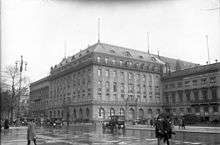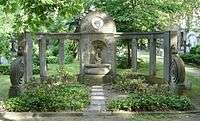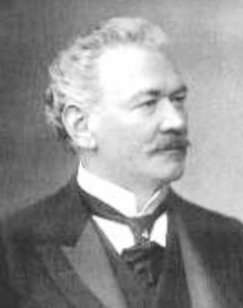Lorenz Adlon
| Lorenz Adlon | |
|---|---|
|
Lorenz Adlon (1911) | |
| Born |
29 May 1849 Mainz, Germany |
| Died |
7 April 1921 (aged 71) Berlin, Germany |
| Nationality | German |
| Occupation | caterer, gastronomer and hotelier |
Lorenz Adlon (German: [ˈaːdlɔn]; 29 May 1849 – 7 April 1921) was a German caterer, gastronomer and hotelier.
Early life
Lorenz Adlon was born in Mainz as Laurenz, the sixth out of nine children of shoemaker Jacob Adlon and his wife Anna Maria Elisabeth Schallot, an accoucheuse. The grandfather Andreas Adlon of the paternal family an electoral groom was originating from the Spessart region.[1][2]
He was trained as a cabinet maker,[2] finishing an apprenticeship in 1872 at the nationally leading Bembé cabinet-making workshop of Mainz. Indeed, Adlon would eventually request its services, for furnishing the future Hotel Adlon of Berlin.[3]
Private life
Lorenz Adlon was married twice. His first wife was Susanne Wannsiedel, the daughter of a hotel manager of Mainz;[4] they had three boys and two girls from 1872 to 1877, until she died in 1878. Adlon got married again to Fanny Claus, a widow from a prosperous family of Stuttgart,[4] who died just short time after in 1893, in Berlin.[3]
Mainz
Lorenz Adlon joined a fellow student, opening a wine store together,[2] for selling what was produced by the many regional vineyards.[4]
During those years, Adlon couldn't resist the appeal, often visiting the Holländische Hof hotel near the Rhinefront, there taking note of the German aristocracy and its culinary customs.[3] Adlon also was an athletic person, and —reportedly — he once catered his whole team, in a profitable experience which particularly fueled Adlon's dream for a gastronomic career.[3]
Lorenz Adlon got earnestly interested for gastronomy after a trip to France; after returning from the Franco-Prussian War, Adlon so started working as an innkeeper,[3] in 1872. In 1876, Adlon accomplished his first big job in Mainz, catering the crowds during a regional shooting contest.[3]
In 1878, Lorenz Adlon opened the Raimundigarten restaurant, a wooden building, built over an abandoned fortification of Mainz,[5] at its northwest, over the bank of the Rhine. Basically oriented for the tourism, it soon became a successful endeavor.[3] Adlon then started exporting Bohemian Pilsener beer abroad, to both the Netherlands and Belgium.[2]
Berlin
Late in the 1870s, Lorenz Adlon enthusiastically[4] moved to Berlin, which was so attractive as the magnificent new capital of the Second Reich.
Once there, Adlon began in the business of selling wines. It became so successful, that Adlon's shop of the Wilhelmstrasse would store three million bottles at some point;[2][6] the value of the investment skyrocketed after a vine pest of the late 1910s, and -in general- also overmastering the German inflation.[3]
Meanwhile, Lorenz Adlon kept managing the catering for international events, in 1881 for the festival of gymnastics of Frankfurt (Deutschen Turnfest), in 1882 for the Bavarian Trade exhibition,[4] in 1883 for Amsterdam's World's Fair. By then, Lorenz Adlon was enjoying a prosperous financial period.[4]
Subsequently, Adlon started acquiring several restaurants, one after the other. He acquired the Mille Colonnes hotel, at the Rembrandt Square of Amsterdam. By 1887, Adlon had already acquired a café at the 62/63 on the patrician Unter den Linden boulevard of midtown Berlin, to Carl Hiller.
In 1896, Lorenz Adlon together with two other businessmen, Hiller and Rudolf Dressel, managed the main restaurant facilities at the Neuer See, during the Universal Exposition of Berlin (Gewerbe-Ausstellung). During the event, Adlon got acquainted with the famous director of orchestra Benjamin Bilse, by whom Adlon got properly introduced to the high society of Berlin.[3]
Lorenz Adlon then took over Hiller's restaurant at the 55 Unter den Linden boulevard. The place already was leading because of its French dishes,[3] and during Adler's management, it became the most exclusive restaurant in Berlin; Adlon then was a recognized socialite.[2] In 1898, Adlon entered into partnership with Teilhaber Klicks, acquiring the 195-room Hotel Continental on the Georgenstraße street,[2] and so Adlon perfected his skills of hotel management.[3]
In 1899, Lorenz Adlon leased the until then decadent two terraces of the zoo of Mainz. Revamped by Adlon, the place started serving famous international treats, highlighting the Bouillabaisse specialty; daily yielding 6,000 daily goldmarks,[3] it once hosted William II, whose ensuing friendship meant Adlon's definitive belonging into the German high society.[3]
Hotel Adlon

- See main article: Hotel Adlon
Shortly after the turn of the century, Lorenz Adlon agreed with the young emperor William II, who disliked his very traditional town palace, to establish a nobel hotel in the town. By 1905, Adlon had invested all what he owned,[6] 2 million goldmarks, for the ambitious 17-million-goldmark project.[2] Adlon managed the process, acquiring several available properties round the 1 Unter den Linden boulevard just besides the Brandenburg Gate, despite the protests of the Berliners.[4]
The luxurious Hotel Adlon opened on October 23, 1907. Emperor William inaugurated it, and then praising that its beauty was even superior to his own Royal Palace,[4] he patronised it regularly for his unofficial residence.[2][6] At the heart of Berlin, the Adlon Hotel became the centre of the social life in the city, and it also hosted all its notable visitors.[4] Before 1914, the aristocracy of all Europe was fond for gathering in it;[4] then -sharing the same area with the most important embassies- the hotel hosted a series of international meetings, relevant to the historical development of the First World War.[6] However, after the war the so supportive German monarchy was deposed, and so the magnificence of the Adlon Hotel started to dim.[4]
Death

After the war, Lorenz Adlon remained reluctant about acknowledging the dethronement of the monarchs. For instance, he refused driving through the Brandenburg Gate by the central line,[5] which had once been reserved for the German nobility; by this obstinacy, Adlon had suffered a severe street accident in 1918, at that spot.[5] In 1921—again at the same place—Lorenz Adlon suffered a second accident, fatal one this time, being hit by a car.
His son Louis continued managing the hotel until it was burned down by Soviet troops in 1945. His wife Hedda Adlon relates in her autobiography that Louis himself was taken by the Soviets and shot, after they mistook him for a General because a servant called him by his title of "Generaldirektor". Great-grandson Percy Adlon, a German film and television director, created the film In der glanzvollen Welt des Hotel Adlon in 1996 about the history of the hotel.
References
- ↑ Bernd Funke: In der Steingasse fing alles an in: Allgemeine Zeitung 4 January 2013
- 1 2 3 4 5 6 7 8 9 http://www.friedrichstrasse.de/berlin/historie/geschichte_alle/lorenz_adlon/
- 1 2 3 4 5 6 7 8 9 10 11 12 13 http://www.adlon-holding.de/online/page.php?P=438
- 1 2 3 4 5 6 7 8 9 10 11 http://www.luise-berlin.de/bms/bmstxt99/9905porc.htm
- 1 2 3 http://www.swr.de/100-groessten-rheinland-pfaelzer/kandidaten/-/id=2616472/nid=2616472/did=2462960/14hlahi/index.html
- 1 2 3 4 http://www.findagrave.com/cgi-bin/fg.cgi?page=gr&GRid=19170163
External links
- biography of Lorenz Adlon (German language)

